Jeep Compass vs Volvo EC40 - Differences and prices compared
Compare performance (213 HP vs 442 HP), boot space and price (34200 £ vs 46600 £ ) at a glance. Find out which car is the better choice for you – Jeep Compass or Volvo EC40?
Costs and Efficiency:
When it comes to price and running costs, the biggest differences usually appear. This is often where you see which car fits your budget better in the long run.
Jeep Compass has a evident advantage in terms of price – it starts at 34200 £ , while the Volvo EC40 costs 46600 £ . That’s a price difference of around 12420 £.
In terms of energy consumption, the advantage goes to the Volvo EC40: with 16.20 kWh per 100 km, it’s slight more efficient than the Jeep Compass with 17.50 kWh. That’s a difference of about 1.30 kWh.
As for electric range, the Volvo EC40 performs to a small extent better – achieving up to 584 km, about 84 km more than the Jeep Compass.
Engine and Performance:
Under the bonnet, it becomes clear which model is tuned for sportiness and which one takes the lead when you hit the accelerator.
When it comes to engine power, the Volvo EC40 has a clearly edge – offering 442 HP compared to 213 HP. That’s roughly 229 HP more horsepower.
In acceleration from 0 to 100 km/h, the Volvo EC40 is convincingly quicker – completing the sprint in 4.60 s, while the Jeep Compass takes 8.50 s. That’s about 3.90 s faster.
In terms of top speed, the Jeep Compass performs minimal better – reaching 188 km/h, while the Volvo EC40 tops out at 180 km/h. The difference is around 8 km/h.
There’s also a difference in torque: Volvo EC40 pulls convincingly stronger with 670 Nm compared to 345 Nm. That’s about 325 Nm difference.
Space and Everyday Use:
Beyond pure performance, interior space and usability matter most in daily life. This is where you see which car is more practical and versatile.
Both vehicles offer seating for 5 people.
In curb weight, Jeep Compass is clearly perceptible lighter – 1667 kg compared to 2065 kg. The difference is around 398 kg.
In terms of boot space, the Jeep Compass offers distinct more room – 550 L compared to 404 L. That’s a difference of about 146 L.
In maximum load capacity, the Jeep Compass performs clearly perceptible better – up to 1561 L, which is about 365 L more than the Volvo EC40.
Who wins the race?
The Volvo EC40 proves to be wins the duel decisively and therefore becomes our DriveDuel Champion!
Volvo EC40 is the better all-rounder in this comparison.
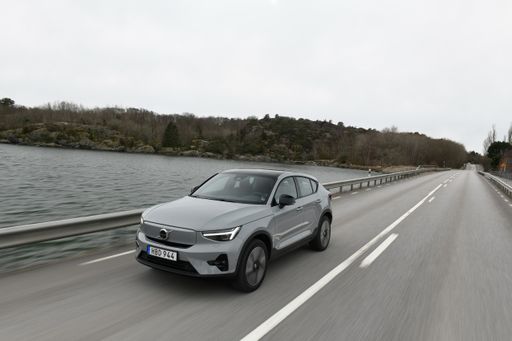
Volvo EC40
Costs and Consumption
View detailed analysis
Engine and Performance
View detailed analysis
Dimensions and Body
View detailed analysis
Jeep Compass
The Jeep Compass packs classic Jeep styling with a surprisingly composed demeanor, equally at home turning heads in the city or tackling a weekend dirt track. Inside it's a pragmatic, user-friendly compact SUV that prioritizes comfort and versatility — a smart pick if you want a dose of adventure without giving up everyday sense.
details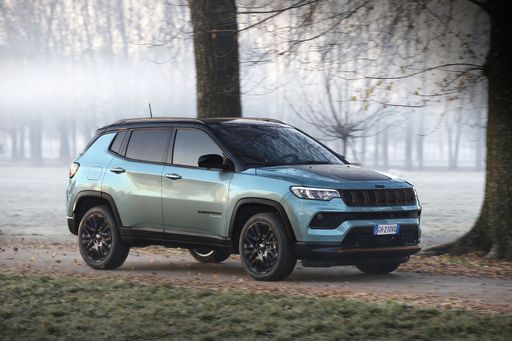
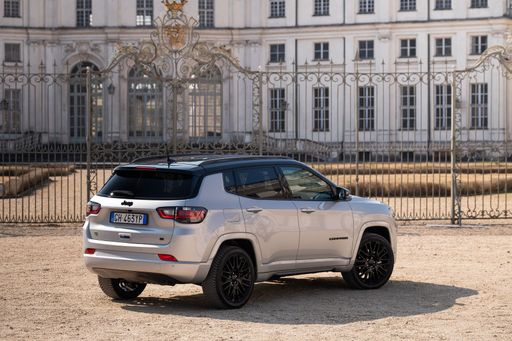
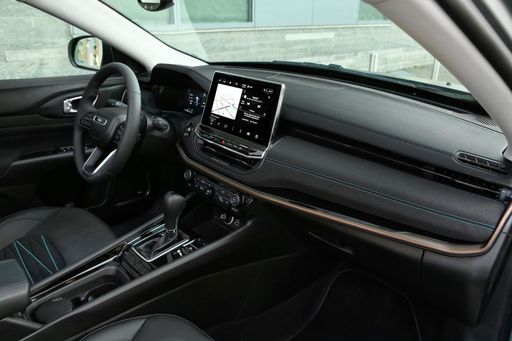
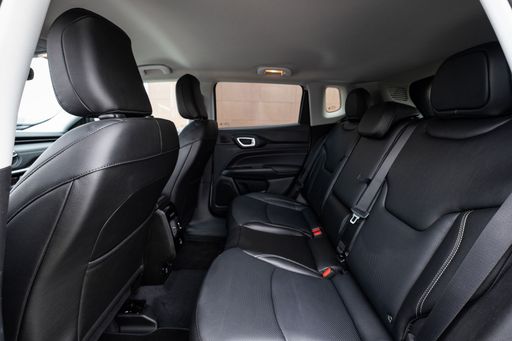
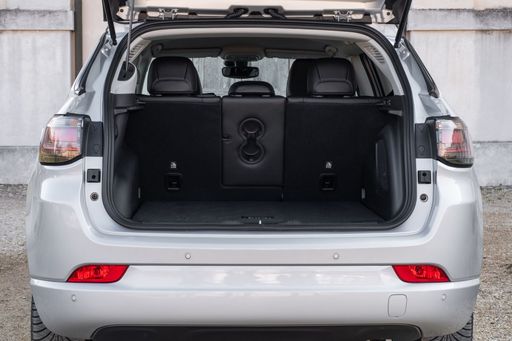
Volvo EC40
The Volvo EC40 feels like a polished slice of Scandinavian calm on wheels, blending minimalist design with a cocoon-like interior that makes everyday driving surprisingly serene. It’s an electric compact that puts safety and comfort front and center, while still injecting enough personality and tech-savvy charm to keep city buyers smiling.
details
Costs and Consumption |
|
|---|---|
|
Price
34200 - 43200 £
|
Price
46600 - 59000 £
|
|
Consumption L/100km
5.80 L
|
Consumption L/100km
-
|
|
Consumption kWh/100km
17.50 kWh
|
Consumption kWh/100km
16.2 - 17.3 kWh
|
|
Electric Range
500 km
|
Electric Range
488 - 584 km
|
|
Battery Capacity
74 kWh
|
Battery Capacity
67 - 79 kWh
|
|
co2
0 - 130 g/km
|
co2
0 g/km
|
|
Fuel tank capacity
55 L
|
Fuel tank capacity
-
|
Dimensions and Body |
|
|---|---|
|
Body Type
SUV
|
Body Type
SUV
|
|
Seats
5
|
Seats
5
|
|
Doors
5
|
Doors
5
|
|
Curb weight
1667 - 2198 kg
|
Curb weight
2065 - 2185 kg
|
|
Trunk capacity
550 L
|
Trunk capacity
404 L
|
|
Length
4552 mm
|
Length
4440 mm
|
|
Width
1928 mm
|
Width
1873 mm
|
|
Height
1675 mm
|
Height
1591 mm
|
|
Max trunk capacity
1561 L
|
Max trunk capacity
1196 L
|
|
Payload
-
|
Payload
395 - 435 kg
|
Engine and Performance |
|
|---|---|
|
Engine Type
Petrol MHEV, Electric
|
Engine Type
Electric
|
|
Transmission
Automatic
|
Transmission
Automatic
|
|
Transmission Detail
Dual-Clutch Automatic, Reduction Gearbox
|
Transmission Detail
Reduction Gearbox
|
|
Drive Type
Front-Wheel Drive
|
Drive Type
Rear-Wheel Drive, All-Wheel Drive
|
|
Power HP
145 - 213 HP
|
Power HP
238 - 442 HP
|
|
Acceleration 0-100km/h
8.5 - 10.3 s
|
Acceleration 0-100km/h
4.6 - 7.3 s
|
|
Max Speed
180 - 188 km/h
|
Max Speed
180 km/h
|
|
Torque
230 - 345 Nm
|
Torque
420 - 670 Nm
|
|
Number of Cylinders
3
|
Number of Cylinders
-
|
|
Power kW
107 - 157 kW
|
Power kW
175 - 325 kW
|
|
Engine capacity
1199 cm3
|
Engine capacity
-
|
General |
|
|---|---|
|
Model Year
2025
|
Model Year
2024
|
|
CO2 Efficiency Class
D, A
|
CO2 Efficiency Class
A
|
|
Brand
Jeep
|
Brand
Volvo
|
What drivetrain options does the Jeep Compass have?
The Jeep Compass is available as Front-Wheel Drive.




